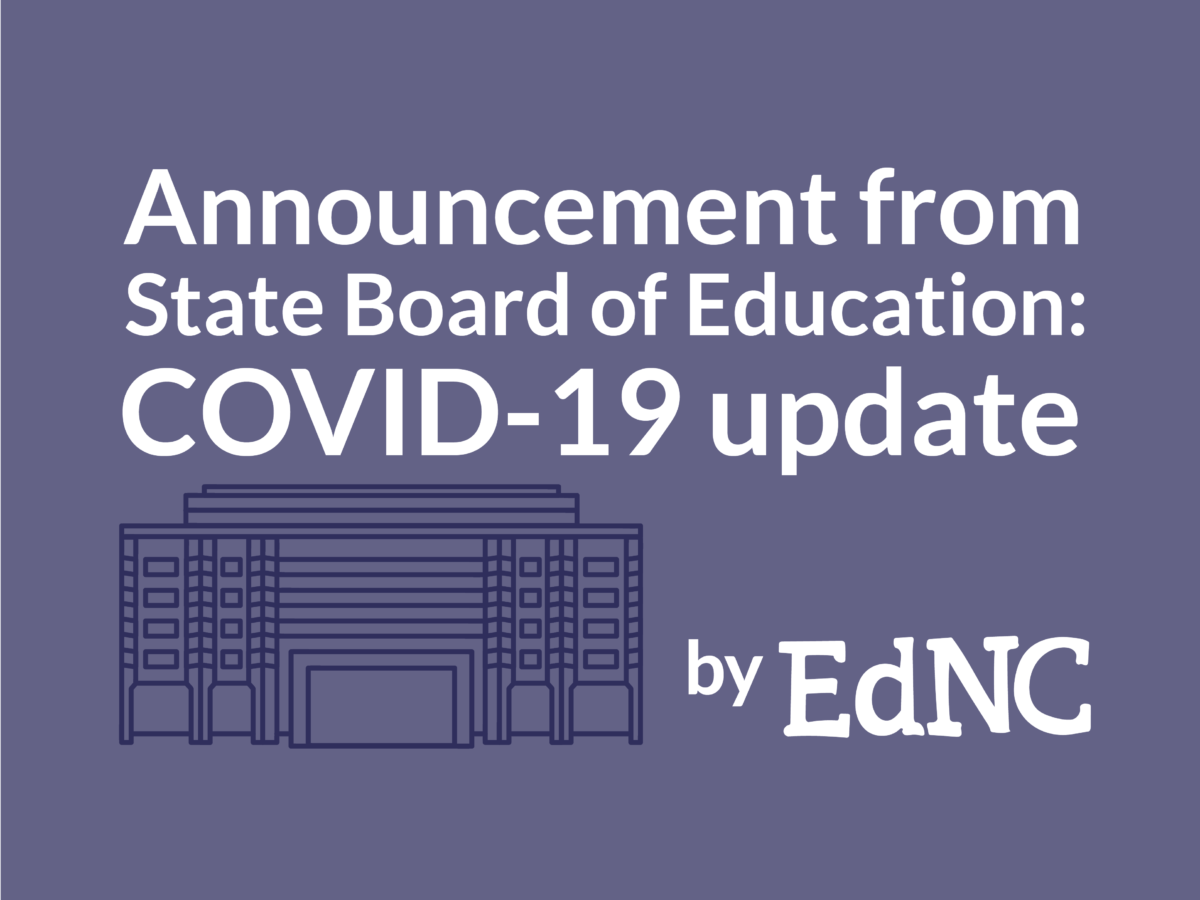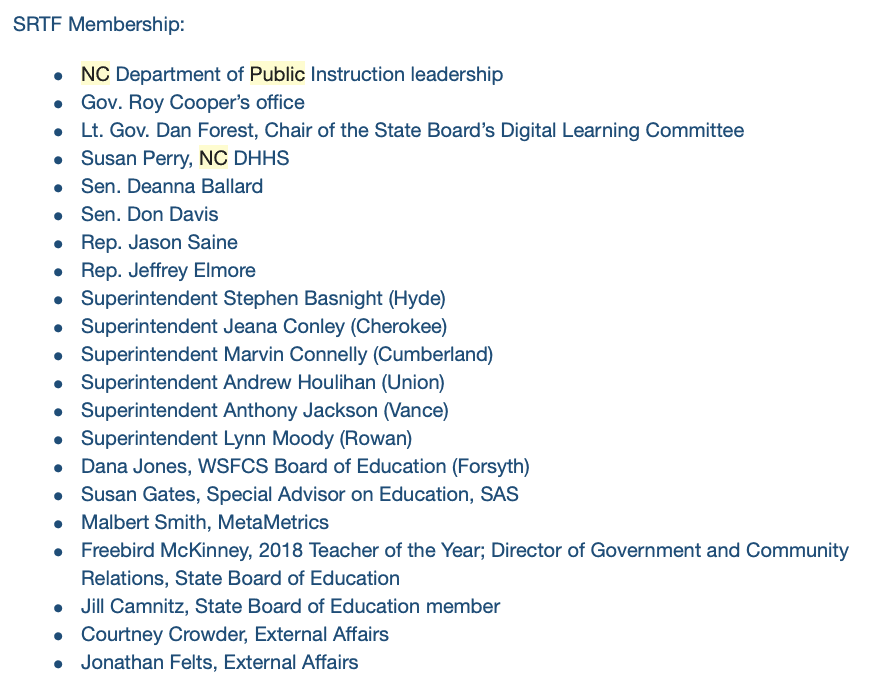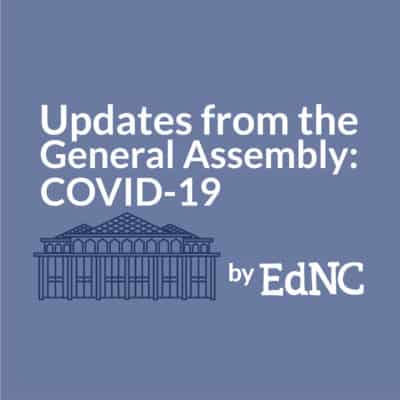

Today’s emergency State Board of Education meeting was packed with items, including a discussion about a new procurement process for a state reading diagnostic tool, a report from the state auditor that found deficiencies at the state Department of Public Instruction (DPI), and a path forward for reopening schools in the fall.
Here is a rundown.
Istation
The State Board of Education and state Superintendent Mark Johnson got into a heated discussion about a new procurement process for a K-3 reading diagnostic tool.
As part of the Read to Achieve program, a diagnostic tool is necessary to measure the progress of students. Earlier this month, the state Department of Public Instruction canceled its three-year contract with Istation for its reading diagnostic tool.
The procurement process for that contract had become a source of a lot of contention. Amplify — a competitor in the bidding process — took issue with how the procurement process happened. The state Department of Information Technology (DIT) has been reviewing how Istation was chosen and put a stay on the implementation of that contract while the issue was being litigated. DIT has yet to issue a decision.
During the State Board meeting, Johnson said a new procurement process is underway to find a reading diagnostic tool for this coming school year.
State Board Vice Chair Alan Duncan asked Johnson why the contract was canceled.
Johnson said that schools are facing a new setting next year because of COVID-19 and he thought it was necessary to move quickly to make sure a diagnostic tool was in place in the fall.
“We thought the best thing to do … is to terminate this contract and rebid, and we are working very closely with DIT on every step of the way,” Johnson said.
Duncan said that if DIT had ruled in favor of upholding DPI’s original contract, then this wouldn’t be necessary.
“Isn’t it true that we would not need a procurement process?” he asked.
“I don’t think that we need to go through hypotheticals,” Johnson said, adding: “We need to take into consideration that school is not going to look the same this August as last August.”
Johnson said DPI is working closely with DIT to make sure the procurement process goes smoothly.
“There were unfortunate issues in the last procurement … some bad actors, lies were told … it’s unfortunate all this has happened, but we want to make sure this is extremely transparent,” Johnson said.
Duncan said he was concerned about DPI’s ability to ensure fairness in the new procurement process.
“The department has made and you have made fairly derogatory comments about one of the bidders,” Duncan said, referencing statements Johnson has made about Amplify. Duncan then asked how independence can be assured.
“That is why we are working with DIT so closely,” Johnson said. “And we are checking with them on every step of the process.”
DPI Audit
A fiscal year-end report for 2019 from Beth Wood, the state auditor, found a number of areas where DPI had been deficient, including in the monitoring of Title I funds. The report was released last night. Here are some of the findings.
In the section related to federal Title I grants
The report stated that DPI did not effectively monitor the spending of sub awards from Title I funds to school districts and charter schools. During the period of the audit, DPI provided $434 million in awards, according to the report.
A response from DPI in the report notes that “(DPI) concurs with the Auditor’s finding and recommendation. School Business within DPI has already taken several steps to address this deficiency in Fiscal Year 2020.”
The audit report also found that DPI “submitted incomplete and inaccurate data in their 2018 annual National Public Education Financial Survey (Survey) to the National Center for Education Statistics. During the audit period, the Department reported $15.7 billion in federal, state, and local education expenditures.”
The report goes on to say that auditors recalculated amounts reported for the State Per Pupil Expenditure (SPPE) included in the survey, and that “inaccurate reporting of SPPE data could affect federal education funding allocated to the Department.”
In DPI’s response, they agreed with the audits finding and stated: “School Business within DPI pursued additional guidance from the U.S. Department of Education and U.S. Census Bureau regarding inclusion of worker’s compensation and residential school expenditure data in the National Public Education Financial Survey’s (NPEFS) State Per Pupil Expenditure (SPPE) calculations. Once additional guidance is received, DPI will update the NPEFS’s SPPE calculation process to include the data, if required by the Federal government.”
In another finding, the audit report stated that DPI did not communicate fiscal monitoring results of school districts and charter schools in a timely manner.
In DPI’s response, it agreed with the findings and said it was taking the following steps to address the problems.
“School Business within DPI has taken several steps to address this deficiency in Fiscal Year 2020. The Assistant Director of for School Business now has direct responsibility for ensuring the monitoring reports are issued timely, which will enable proper managerial oversight of the monitoring report process.”
“In addition, School Business developed a revised risk assessment to identify districts for monitoring during Fiscal Year 2020 and better prioritize monitoring resources. Finally, School Business will evaluate its existing monitoring procedures identifying changes needed to reporting timelines or templates to provide timely and actionable feedback for districts who have been subject to monitoring.”
In a section on federal special education grants to states
The audit said that DPI “improperly charged $18.3 million of expenditures to a Special Education – Grants to States award that was no longer available for obligations. For the fiscal year, the Department spent $347.9 million to provide for the education of children with disabilities.”
In DPI’s response, the department agreed with the finding and wrote, “After notification of the issue by the auditors, DPI management investigated further and learned that accounting adjustments had been utilized to carry the expiring funds forward into subsequent years’ grants, with the entire amount now maintained as unallotted funding within DPI’s IDEA FY 2018 grant award balance. DPI is currently working with the U.S. Department of Education to determine how to address the unexpended funds.”
Here is the audit report. You can find the sections on the Department of Public Instruction by conducting a word search.
The State Board of Education approved a response to the audit and added it as new business after the meeting had already started. Johnson said it was “petty” for the State Board to add this item when DPI was still working through the issues from the audit, which was just released publicly last night.
Reopening school
During the State Board meeting, Johnson announced a new task force that will study how to safely reopen schools in the fall.
Encompassing members of the State Board of Education, DPI, Republicans and Democrats from the legislature, representatives of the governor’s office, and others, the task force will examine ways to improve remote learning, address the learning gap from missed school, and develop guidelines to maintain social distancing in school settings, according to a press release.
“We have all been forced to react to the ongoing crisis, and we know there are frustrations as we face these challenges forced upon us,” Johnson said in a press release.
“People keep tossing around the phrase ‘ the new normal.’ We could not be more proud or appreciative of how educators and families have stepped up to these challenges, but we want parents, students, and educators to know that we recognize the current situation is not sustainable. DPI is convening this task force in an effort to efficiently address the challenges that lay ahead when we reopen schools and to put us back on a proactive path that, once again, will allow North Carolina students their best opportunities to pursue their own pathways to success.”
Here is a list of the membership of the task force.


The North Carolina Association of Educators (NCAE) released a statement critical of the task force composition in the afternoon.
“This morning, State Superintendent Mark Johnson announced a Schools Reopening Task Force (SRTF) with the stated purpose of putting ‘North Carolina public education back on the proactive path to address the challenges of post-COVID-19 education.’ While this appears to be a noble goal, his appointed membership of 20 people is significantly weighted against actual educational practitioners, with only one active teacher, who is also a legislator, named to the task force,” said NCAE President Mark Jewell in a press release. “Not one cafeteria worker, school counselor, janitor, school psychologist, or teacher assistant is included. If Superintendent Johnson wants to fashion a plan to deal with the real-world impacts of COVID-19 on public education, he should include an adequate representation of educators who are actually facing those problems right now.”
According to the press release from DPI, in addition to the membership of the task force, it will include advisors such as “district CTOs and CAOs, thought-partners from education-focused organizations, and teachers, principals, parents, and students.”
Emergency leave
The State Board revisited its policies on emergency leave, and voted to extend the emergency paid leave through May 31.
The State Board passed an emergency leave policy change in late March that lets districts pay and give benefits to eligible staff who can’t work remotely, have child care or elder care needs, and/or are at high risk for getting COVID-19, among others. The policy change allowed for up to 168 hours of paid emergency leave.
The new addition increases that amount to 328 hours. The policy change originally only ran through April 30, but as of today, that has been extended until the end of May.
Here is the amended policy.
The State Board of Education also announced the North Carolina Governor’s School will not go forward with their programs for this year due to COVID-19. Sophomores accepted this year will be allowed to attend in 2021.


